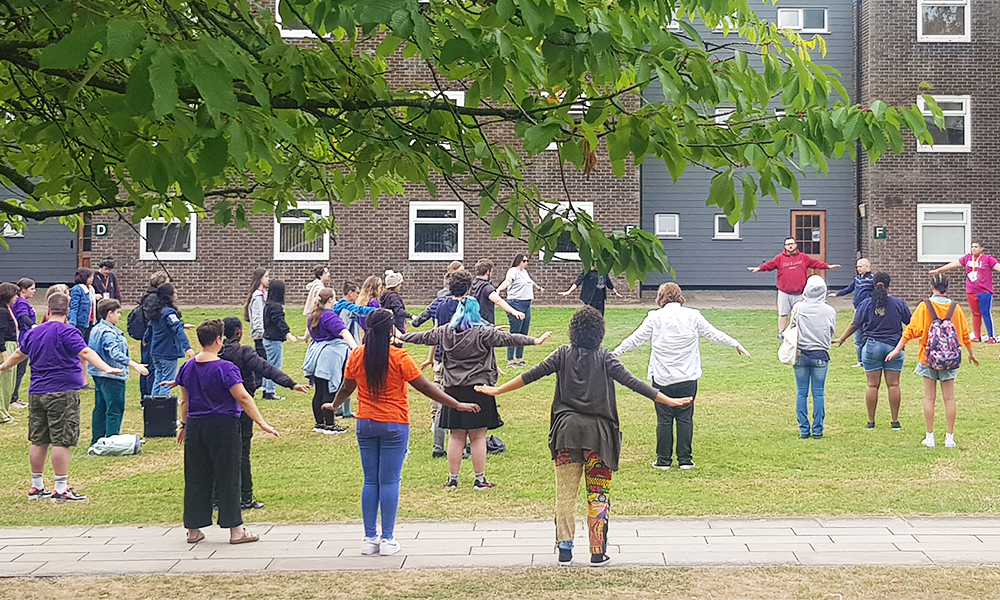‘It’s rare to find a space where people’s differences are celebrated – and yet I have found that Orchestras for All is such a space.’
According to disability equality charity, Scope, there are currently 14.6 million disabled people living in the UK. That’s 22 per cent of the total population, with 9 per cent being young people – and yet, one in three disabled people feel that disability prejudice exists.
At Orchestras for All however, we fully embrace equity, diversity and inclusion. This means celebrating each and every one of the young musicians or staff members that we work with regardless of the daily challenges they might be facing.
Ahead of International Day of People with Disabilities on 3 December 2022, we caught up with one of our Wellbeing Tutors, Xia, to find out more about their firsthand experience of living with a disability and why raising awareness of disability is vital in today’s world.
Please introduce yourself and tell us a little about what you do.
Hello, I’m Xia-Leon. I’m from Cambridge, non-binary (trans-neutral) and my pronouns are they/them. I like to compose music that responds to the beauty and fragility of the living Earth, reflecting on issues of spirituality and identity. I’m also autistic and have been blind for almost all my life. In future I hope to train as a therapist, exploring how listening, creative practice and embodiment could form part of healing processes.
What does music mean to you?
Music has played diverse roles in my life. At times, it’s been a safe place that I could retreat to, away from the clamour of the world and complex social dynamics of my peers. It’s also been a vessel for social connection – a space where I could meet others who share this part of my identity. Most people I tend to engage with are either musicians, composers or music creators.
Pictured: Xia-Leon (left) enjoys a ‘rise and shine’ wellbeing activity at NOFA’s summer course in Nottingham
One of my earliest memories is of my dad handing me stones to throw into the ocean. I felt so much joy and fascination at the sounds that emerged from the different shapes, weights and sizes of stones as they hit the water. Although it’s not strictly ‘musical,’ it was undoubtedly part of the early explorations of sound that ultimately birthed my later passion.
In terms of my listening preferences, I love Morton Feldman’s late music as well as the jagged beauty of Pauline Oliveros’ accordion improvisations. Laurie Spiegel’s evolving soundworlds and Salvatore Sciarrino’s luminous, fragile timbres fascinate me and have influenced my own work. I also love the harmonies of traditional Bulgarian vocal music, the lyrics and music of Scottish folk singer, Karine Polwart, and I was recently introduced to Malian artist, Oumou Sangare, whose beautiful and versatile work I look forward to exploring further.
How did you first find out about Orchestras for All (OFA) and what’s been your involvement with the charity so far?
After completing a Masters, I was looking for positions that would prepare me for my future training as a therapist and allow me to hone my existing skills. I came across the opening to work with OFA as a Wellbeing Tutor and the role seemed perfect: I would be supporting people from a huge range of backgrounds in a musical setting. I was successful with my application and attended my first National Orchestra for All (NOFA) course in July. It was a privilege to work alongside my fantastic colleagues to support a group of amazing young people, seeing the brilliant culmination of their work together over those four days.
On 3 December 2022, OFA and many others worldwide will be celebrating International Day of Persons with Disabilities. Could you tell us why raising awareness of disability is so important and what it means for you?
As someone who interacts with the world free from ‘visual dependence’, I am very lucky to have grown up in a culture where perceptions of accessibility have come a long way. I had tactile and Braille resources throughout my education and in the UK, it’s not unusual to see someone out walking with a white cane. Most people I know make me feel that blindness is only one aspect of who I am – one node in our connection to be acknowledged and supported, which infuses the relationship in multiple ways.
‘We must move away from the paradigm of ‘inclusivity’ to one that strives towards equality,’ urges Xia-Leon
We have a long way to go before we reach complete equality in the world. It would mean radically reassessing what we value, both individually and collectively, and reshaping our existing frameworks to ensure that everyone’s voice is heard, so they can contribute fully and meaningfully. We need to recognise that change is needed, with the fierce yet compassionate desire to come together and make it happen. All too often, raising awareness is framed as an end point. I think it’s far from that but it’s a crucial first step.
Spending a lifetime moving through a world that simply isn’t made for you is exhausting – especially when articulating who you are and your needs isn’t something many of us have been taught to do. With the help of allies, I hope that those of us who do have the resources to raise awareness can offer others the tools to join us and together, we can learn to use them. An equal world is a safer, happier place for everyone.
Could you tell us about some of the barriers visually impaired people face in music?
During a rehearsal I played in as a 13-year old, I remember a conductor saying: ‘You have to look at me. Your ears are not enough.’ This is a common barrier I’ve encountered throughout my musical training and despite the stereotype of blind people as exceptionally gifted musicians, often there is still a perception in this ocular-centric society that it’s not possible to engage in musical practice without the visual sense.
Other barriers are much simpler and easier for me to accept as ‘just one of those things’. Although I no longer sing in choirs or play instruments, there was very little music available in Braille notation when these were still integral parts of my life, so I learned almost everything by ear. Even when I did have access to Braille scores, I had to memorise them, since I couldn’t read the music with my fingers and play at the same time.
NOFA’s Wellbeing Tutor, Xia, attends a sectional rehearsal with diverse young musicians from across the UK
As a composer, my music has also been impacted by only being able to read up to two lines of music at once (by reading one line with each hand), rather than having an overview of the page as sighted music readers do. It means my musical structures – the shape of the path a particular piece traces through time – are often much simpler than those of my peers. However, the intimate relationship I form with my work by processing it through touch is a dimension many stave-notation users are missing.
Why do you feel it’s important for an inclusive charity like OFA to exist?
It’s rare to find a space where people’s differences are celebrated rather than viewed as tragedies or challenges to overcome – and yet, I have found through personal experience that OFA is such a space. During my time with NOFA, I taught Braille as part of a wellbeing challenge and connected with neurodivergent members who previously, may not have had many role models they could relate to like their neurotypical peers. At OFA, I felt the very aspects of my lived experience were not a burden; they became an entry point for meaningful contribution to the charity’s work, which is empowering and invaluable.
Read more: 13 ways you can be kind to others in an inclusive youth orchestra >
How can arts organisations better support young musicians and staff members with disabilities?
Arrange for music to be transcribed into Braille in advance, and be sensitive to who is in the room when giving instructions. The most important thing for me is to move away from a paradigm of ‘inclusivity’ to one that strives towards equality. ‘Inclusivity’ means allowing people into existing frameworks, often created by those in positions of power, and giving them the tools to be there without changing the frameworks themselves.
National Orchestra for All musicians, orchestral tutors and wellbeing tutors team up for group activities
But you could go further: maybe follow Daniel Barenboim’s example and conduct from memory, if this is open to you, and lead a rehearsal where everyone has their eyes closed or faces away from you. Explain on your public platforms that these are the approaches you take, so that no member is singled out. Connected with this, ask all members, disabled and non-disabled, to share their needs with you, for example through OFA’s ‘PEN profiles’ (as written in the young person’s own words). This will help to convey that you are serious allowing these to shape your organisation alongside each of your members’ strengths.
If you could give three top tips to disabled young people who are considering starting out on their musical journey, what would they be?
1. Listen as widely and as deeply as you can, discover what you love and spend time with like-minded people or communities that value you and make you feel excited about music-making.
2. There may be times when things get tough. Know you’re not alone. These troughs or valleys don’t make you any less of a musician. Stay connected with that initial spark: go back to that person if you can, listen back to that piece, relive that experience if it’s possible and safe to do so. Keep listening and nourishing your creative fire in any other ways that have meaning for you. It might take some time to reignite but it will happen, even if your musical practice changes radically in the meantime.
3. Stay connected. Go back to that person, replay that piece or relive that experience. Keep listening and nourish your creative fire in a way that has meaning for you.
Finally, please complete the following sentence. Orchestras for All is…
…a vibrant, invaluable community shaped by the diversity of its members’ strengths and needs, which dissolves the barriers that so many young people face and welcomes their skills and passion into an industry that is enriched and enlivened by those gifts.
Please support our life-changing musical programmes and donate today >








